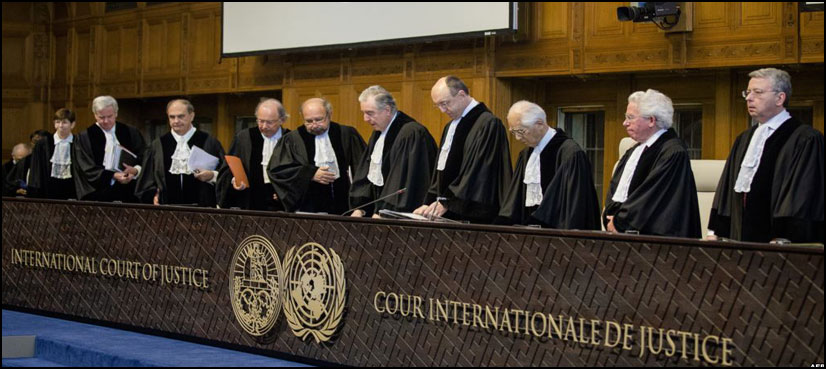
Time and again questions are raised about the efficacy and applicability of international law. It is incessantly propagated that great majority of the rules of international law are followed consistently every day as a matter of course and states abide by them.
It is considered normal that international law is obeyed implying that international law is much more than a haphazard collection of principles that can be ignored at will. It is usually given to understand that the international corpus of rules is meant to be followed and cannot be trifled with. Before commenting that in Israeli-Palestine case many tenets of international law are violated it must be mentioned the reasons that make international law to work and bring to fore its effectiveness.
What makes the current corpus of laws considered as international law relevant and effective is the practical reason that international law is based on common self-interest and necessity of the global state system. As it stands today, international society is more interdependent than ever and the volume of inter-state activity continues to grow. International law is needed in order to ensure a stable and orderly international society.

It is in every state’s interest to abide by the rules of international law for they lay down orderly and predictable principles for the conduct of international relations and international commerce.
In this respect it is cited that it is considered imperative to ensure the allocation of the scarce resources of the high seas and ocean floor is achieved smoothly and equitably and it is only through rules of international law that are theoretically binding on all states that this can be achieved and likewise with the protection of the environment and the management of climate change. Thus, a major reason why international law works is that it provides a stable and authoritative regime for the conduct of international relations and the regulation of global issues in an increasingly interdependent world.
The argument holding ground in this context is that in its entirety law has a self-perpetuating quality as it is associated with human existence. When it is accepted that the principles governing the activities of a society amount to law, as is the case with states and international law, the rules of that system assume validity and force all of their own. It is quoted in this respect that if a state is presented with a choice of action, one which is legal and one which is not, it will take pressing reasons for the state to act consciously in violation of the law and it would be tantamount to meandering into an uncharted territory.
It must here be borne in mind that breaking international law, like breaking national law, is not a matter to be taken lightly and certainly it is not the preferred course of conduct for a state for very obvious consequences of such a conduct of affairs. This implication it implies that a psychological barrier is erected against breaking international law simply because it is law. If a state does embark on such a course of conduct, its action will be described as unlawful or illegal and these are regarded as more powerful forms of criticism than behaviour which is simply immoral or unacceptable.
The psychological force of international rules as a system of law is a reason in itself why international law is obeyed.
It is widely known that international law operates hand in glove with international politics and diplomacy and that is the vital domain it operates in. Its most potent field of operations is, in fact, in the foreign affairs’ apparatuses of states as well as legal departments of the world-wide state governments and in international organisations. Along with the army of legal advisers available to non-governmental organisations, these are the actual practitioners of international law.
The crucial point is that the great majority of these officials will have been trained in the national law of their own countries and they are likely to approach international law in the same way as they would any other legal system. The practitioners of international law may therefore develop a habit of obedience derived from their own training as national lawyers which serves to encourage respect for international law. This is one of the most important points signifying the soft belly of the process of international law.
One of the critical issues of International law is that it is not an adversarial system of law as it is essentially flexible in its nature and content. Many of the rules of international relations have evolved from the practice of states and often these do not stipulate rigid obligations or confer overriding legal rights. It is often observed that in some circumstances, the substance of a rule may be unclear, as was the case with the law on the breadth of the territorial sea until the deliberations of the Third UN Conference on the Law of the Sea.
It is a fact of the system that in many areas it may not be possible to achieve a clear and unambiguous statement of a state’s legal position. This is the flexible nature of international law. This flexibility may be perceived as a weakness, for states need to know with some degree of certainty the precise scope of their legal obligations and the extent of their legal rights.
In this context it is perceived that uncertainty is the mother of instability. In international law, however, the flexible or open-ended nature of the rules means that disputes are less likely to be seen as right versus wrong. The absence of rigid and precise obligations leads to modest claims and, because there may be no objectively right answer, there is a premium on compromise. Moreover, the flexible nature of international law means that a state may be able to choose from a range of policies, all of which will be legal. It will not be hamstrung or feel hampered. The fact that international law rarely leaves the state with only one course of action is a great advantage for a system so bound up with politics and diplomacy.
The main issue emerging out of the tussle between principle and practice is there is much a state can lose through a violation of international law.

Apart from the legal sanctions that might be imposed there are other political and economic costs to be paid.
The loss of influence and the loss of trust consequent upon a breach of the law may mean a reduction in overseas trade, loss of foreign aid or a refusal to enter into negotiations over some other matter. Similarly, many states may not be prepared to enter into new treaties with a state if it has a history of violating existing agreements.
The true international cost of US and UK intervention in Iraq and Afghanistan is still not known. Keeping in view the wide differences in perspectives no credible effect of high-sounding moral pronouncements could have on rational analysts of international relations.
Moreover, apart from these more tangible considerations, one should not underestimate the very public and embarrassing criticism which flows from a breach of international law, especially in such fields as human rights and crimes against humanity. This is precisely where the Israeli-Palestinian issue falls and it is certainly a grey area as far as international law is concerned.
from International News Today - Breaking News, US News, World News https://ift.tt/V5R7Igq
via IFTTT